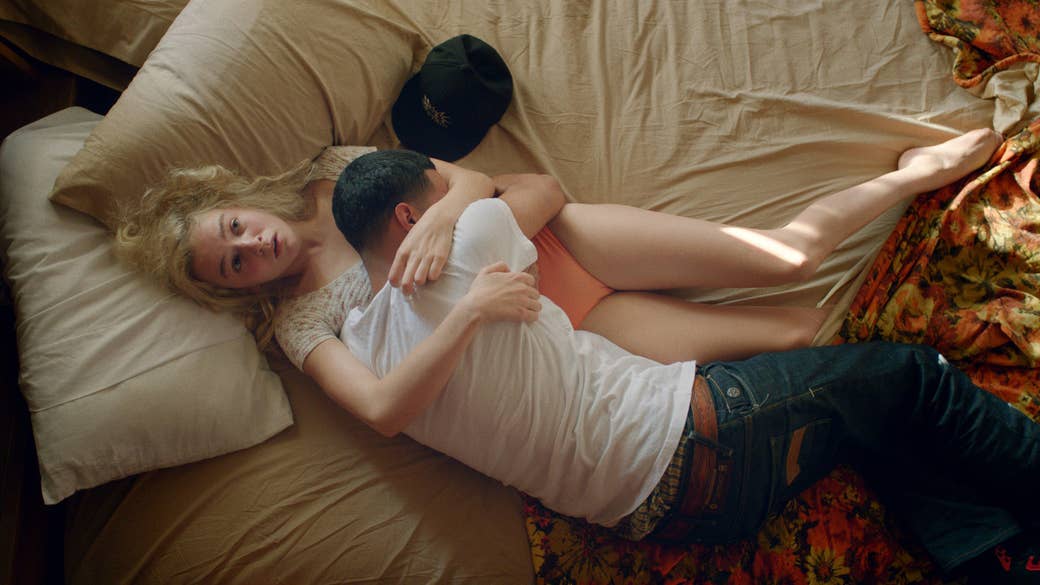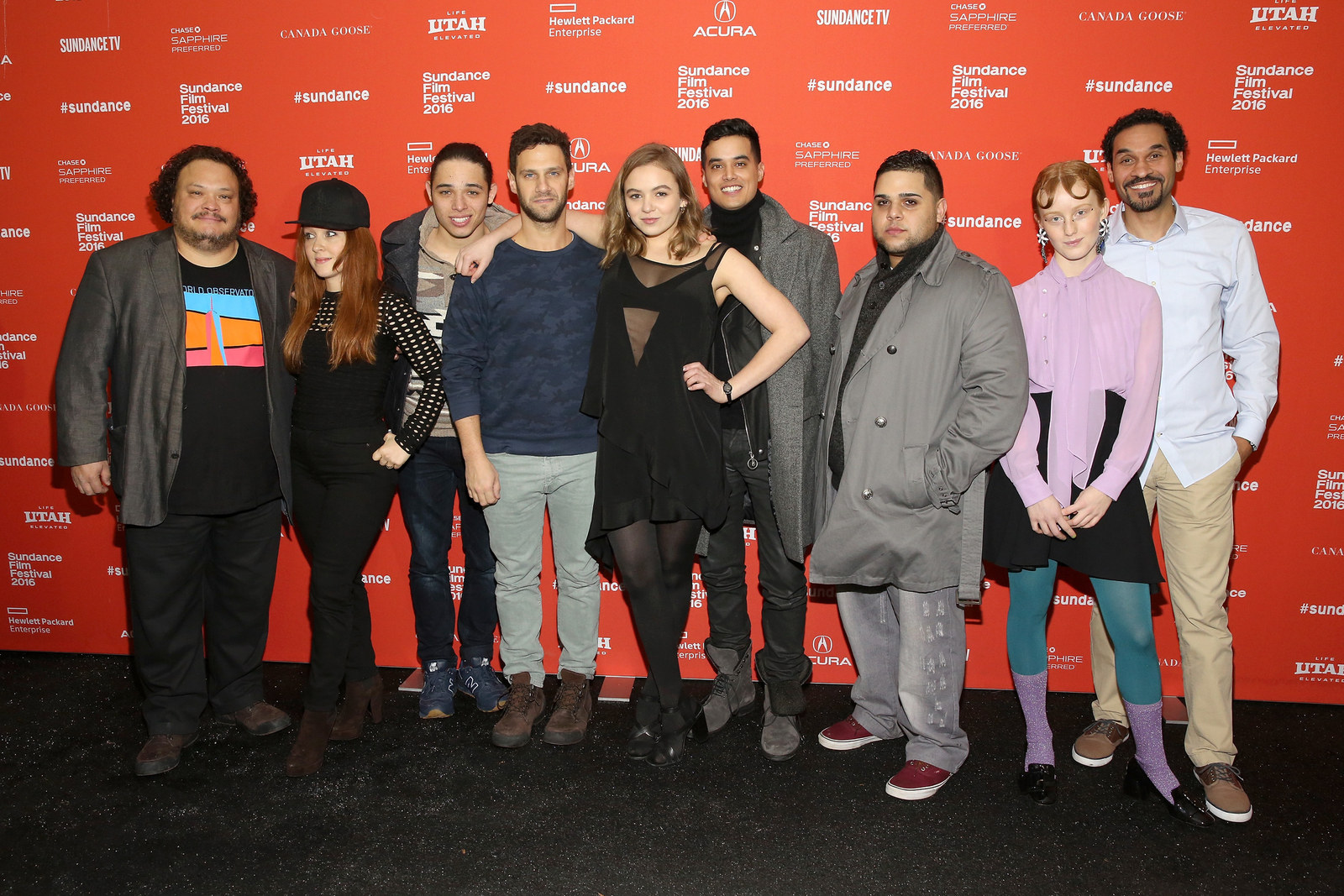
It’s difficult to remember exactly what moment made people walk out of White Girl, which recently premiered at Sundance, but it might have been when the lithe, peroxide-blonde protagonist, played by Morgan Saylor, takes off her dress and starts riding her newly acquired boyfriend in the back of a car as they return to Queens from a party in Chinatown. Or when that same protagonist shrieks, “I HAVE AN AMAZING IDEA,” as she sprinkles cocaine on her boss’s penis and, along with a female co-worker, proceeds to snort it off.
You could argue, as others have, that scenes like these glamorize the destructive actions of these young white girls, who moved into a predominantly Puerto Rican neighborhood in Queens over summer break from college — because, as one of them says, “now we can have our own rooms.” Or that new filmmakers include graphic scenes — of sex, of drug use, of violence, of general weirdness — just to get their films and names noticed. And that White Girl exploits its protagonist and, to quote Variety reviewer Peter Debruge, offers her up as "proof that white girls can be as ‘hard’ as the rest of them."
Or you could think of this film as a horror story of white female privilege — of its destructive potential, but also its limits. “Let’s start with a name like White Girl,” director Elizabeth Wood told me. “Aside from being a reference to cocaine, this is a girl dealing with whiteness, with being a woman, and how both of these things change her privilege, her power, in every situation.”
The 88-minute film has the feeling of a long hangover — the sort of hangover that can actually spur you to change your behavior, or your perspective, or the trajectory of your life. The basic premise: Leah (Saylor) and her roommate, both of whom look and dress like thousands of college freshman across the U.S., move to Queens, where they continue the nightly partying habits they picked up somewhere between high school and attending college at The New School. One night, they need weed, so a drunk and brazen Leah goes down to the “sketchy” guys on the street to score some; in her search, she attracts the eye of Blue (first-time actor Brian “Sene” Marc), who acquired the name for his sensitivity.
What follows is, as Wood and producer Gabriel Nussbaum put it, a contemporary version of Romeo and Juliet. “Take a close look at Romeo and Juliet,” Nussbaum told me, “and you’ll see that’s a story about lust. It’s a sexy story! They’ve known each other three days!”
While Romeo and Juliet run up against the realities of tribalism and blood vendettas, Leah and Blue’s love/lust disintegrates for 21st-century reasons that have everything to do with what their respective classes, races, and genders permit them in American society. While Leah spends a few moments in Blue’s world — sitting on the stoop, briefly visiting the apartment he shares with his grandmother — she spends most of her time introducing, or, more appropriately, slamming, him into hers. Come to this party in Chinatown, she says, not mentioning that it’s for the magazine she interns for, a party full of entitled white people who will automatically view Blue and his friends the same way she did: as drug dealers, as exotics, as people there to service their needs.

As the narrative unfurls — Blue obtains a large stash of coke to sell for jacked-up prices to those same white people, and things go downhill from there — Leah repeatedly tells him that “things are going to be all right.” It’s a phrase that underlines their power discrepancy: For a white girl of means, there’s always another route, an out. For a Puerto Rican man with no capital or connections, that's simply not the case. But even Leah’s power has limits. As Nussbaum explains, “the movie is about someone who’s discovering where she falls in the power hierarchy: She has power as a white person, but as a woman, she faces risk and insult and aggression. She’s not at the top of the ladder.”
She can exploit her attractiveness and sexuality to a certain point, but that self-exploitation then morphs into others’ exploitation of her. Her boss at the magazine (Justin Bartha, playing a very plausible douche) spots her immediately as someone who thinks of her sexuality as power, as does a lawyer (Chris Noth, playing up the creep side of his Mr. Big-ness) whom she enlists to help get Blue out of jail. At 19, with a nubile body and a childlike habit of chewing her lip, she's never had a problem she couldn’t solve by flirting, giggling, and getting high. But, by film’s end, she’s confronted with the dark underbelly of those approaches to power.
Saylor, best known as the sullen daughter in Homeland and now finishing her first year as a math major at the University of Chicago, is almost unrecognizable as Leah, but found herself relating to Leah's "discovery" of her own privilege. “Societal differences are visible in New York and big cities much more than the sheltered life that Leah, or me, or a lot of people have in the homes they grew up in,” she said. “Leah doesn’t think about the repercussions of her actions, but I think at the end, she’s learned that being white and being a woman is powerful and weird and so fucked up.”
Wood herself realized as much when, as a college student, she lived through an experience much like the one depicted in the film. Afterward, she was working on a documentary “about these real boys that sold drugs on the corner — it was about one of them getting arrested, and me filming outside of Rikers [Island], and juxtaposing their story of 'I sell drugs but I don’t do drugs, it’s really hard for me to find an actual job' with all my white friends, listing every single drug they did, proudly, while sitting at Parsons, where they’re paying 50 grand a year, not doing their homework, and snorting Adderall. And I was like, these kids are the ones fucking up. The white kids, they’re terrible. And this film, it’s pretty much ‘The White Kids Are the Worst.’”
“Noticing isn’t enough,” Marc, who plays Blue and grew up in Brooklyn, explains. “[Wood] obviously lived this, and she noticed it, but I think the movie is doing something about it — it brings it to the light. I mean, I see that privilege every day. On the plane here, I was talking to this executive guy, a person of color, who was coming here for meetings, and we’re talking lower than this [normal volume], and this woman sitting across the aisle, she leans over and says, ‘You guys need to keep it down.’ But then there’s a threesome of people in front of her, a white woman and two white men, being loud and obnoxious, and she didn’t say a word.”
White Girl is a tale of coked-up microaggressions, but never in a way that feels didactic, or like an after-school special. It shows instead of tells. “I think there’s a bad version of this film that we didn’t make,” Nussbaum says, “in which the girl would’ve been like an earnest documentarian, talking openly with everyone about race issues and about gentrification. But if someone is saying [about White Girl] that it really missed the boat, it could’ve talked about all this stuff, then they missed it because they weren’t spoon-fed.”

After seeing White Girl, I was sitting in the audience waiting for Kelly Reichardt's Certain Women, a beautifully sedate and understated movie, to start. A group behind me started talking about White Girl: “I didn’t need to see that guy’s dick covered in coke,” one guy said. “I just don’t know why I needed to see that.” When I told the cast that, they laughed. “They want to do those things themselves,” Marc exclaimed, “but they don’t want to think about other people doing them.”
“But do they not want to see it or do they not want anybody to see it?” Nussbaum asked. “Because if they don’t want to see it, that’s their prerogative; they can watch something more sanitized. But if they don’t think anyone should see it, I wonder if they would say the same thing if the genders of the scene were inverted: if it was a male protagonist, snorting coke off a woman’s nude body.”
“In Wolf of Wall Street, they’re snorting coke off a woman’s asshole!” Wood interjects.
“Anyone who says ‘I don’t need to see that’ after seeing a film or listening to a piece of music or looking at a piece of art doesn’t understand the nature of art,” Bartha says. “Art is to be confronted with someone else’s perspective, and if you don’t want to be confronted, then you should stay in your own room and not do anything. And that’s the ultimate issue; ignorant people don’t want to see it, because then they don’t have to join the world and deal with those problems: of drugs, of the prison system, of society.”
White Girl is an imperfect and uncomfortable film — like Darren Aronofsky’s Requiem for a Dream, it’s one you watch once and never want to watch again. Other films at Sundance, like Certain Women, sink deep in your heart and don’t reveal their strength for weeks; still others, like Nate Parker’s The Birth of a Nation, bear their ideological punch with a fist. And while some audiences might misconstrue White Girl’s overarching critiques as celebration, its dedication to excess — like Spring Breakers before it — is part of the point: “This film was intended as a provocation,” Wood says. “It should give you a stomachache,” Bartha continues. “It should give you anxiety. And if it doesn’t, you’re either numb to it or not paying attention.”
Sometimes that sort of visceral reaction is necessary: not to marvel at the bare breasts, or to lust after the piles of cocaine, or to remember the crazy time someone got thrown in jail, but to be confronted with the reality of who gets to look back on those experiences in wonder and nostalgia, and whose lives are ruined by them. Who, in other words, holds the power of excess — and who suffers for it. White Girl is a fucked-up, inherently unfair nightmare dressed as a party — which might be the best way to describe the American Dream today.
White Girl premiered at Sundance and is seeking American distribution.
